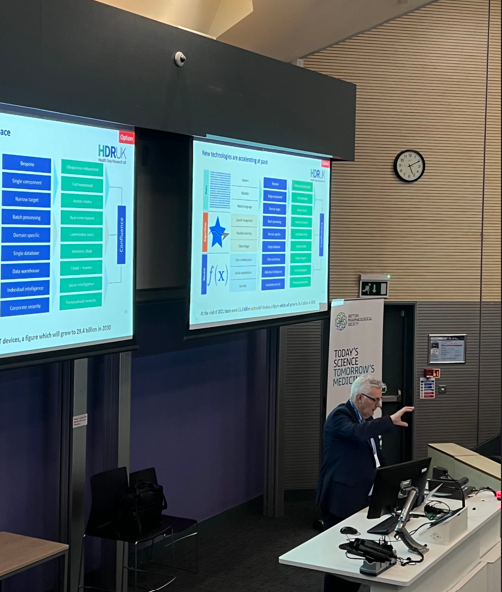Published: 27 Nov 2024
Category:
By Chau (Rachel) Vu
On October 24 2024, I had the privilege of attending the British Pharmacological Society's President's Lecture, where Professor Andrew Morris, President of the Academy of Medical Sciences and Director of Health Data Research UK (HDR UK), shared his insights on the transformative power of health data in clinical science. As a final-year Biochemistry student at University of Birmingham with aspirations to pursue higher studies in pharmacology and drug discovery, I was excited to hear from a leader at the forefront of health data research. The discussion also featured established researchers like Professor Sir Mark Caulfield, a well-known figure in clinical pharmacology, which made the experience even more special.
Professor Morris began by guiding us through a historical journey of ground-breaking scientific achievements—from the invention of the MRI scan in 1984 to more recent breakthroughs like immunotherapy and CRISPR. These milestones highlight the incredible pace of scientific progress over recent decades and set the stage for what’s possible as we push the boundaries even further. Yet, despite these advances, healthcare systems like the NHS are facing growing pressures, such as the declining of life expectancy in the UK, underscoring the urgent need for real-time health data to improve patient care and outcomes.
A key insight from the lecture was Professor Morris’s discussion of health data fragmentation. Despite the abundance of medical data, much of it remains isolated within separate systems, preventing a holistic view of patient health. Professor Morris emphasized the exciting potential of artificial intelligence (AI) to aggregate, sort, and curate high-quality data, enabling a more cohesive healthcare system. What really struck me was Professor Morris’s 20-year vision for HDR UK: a unified framework for large-scale data and analytics that would democratise data access, enhancing patient interactions and accelerating scientific discovery by driving forward clinical trials and research.
To harness the full potential of data, Professor Morris stressed the importance of cross-sector and international collaboration. Reflecting on the global response to COVID-19, he shared that 12 pioneering projects were conducted across 19 countries to expedite the search for a cure. This example was particularly inspiring to me, as it demonstrated the monumental impact researchers can make when united in a time of crisis. It reminded me of my own summer research studentship, where I worked with biophysical and genomics researchers to model patient mutations in the subcortical maternal complex. This experience opened my eyes to how collaboration can lead to exciting advancements in healthcare, and I’m eager to learn more about these dynamic partnerships in the future!
Finally, Professor Morris addressed a decline in drug discovery in recent years, pointing to both the challenges and opportunities that lie in AI and tools like AlphaFold for advancing drug design. As a student with a deep interest in pharmacology, his discussion provided valuable insights into how these cutting-edge technologies can streamline drug discovery. It reinforced my belief that combining biochemistry with data science will be crucial to my own career development, as I aspire to contribute to innovative solutions that drive the future of medicine.
Attending the President's Lecture was truly inspiring and deepened my passion for pharmacology and drug discovery. Professor Morris’s insights ignited my curiosity about data science in personalized medicine and the transformative potential of AI in healthcare. I'm eager to explore how AI can streamline drug discovery, from identifying target molecules to predicting therapeutic responses, and I'm motivated to tackle data fragmentation challenges for a more integrated approach to patient care. This lecture has inspired me to deepen my understanding of these fields and think about how I can contribute to advancing data-driven strategies in pharmacology, ultimately aiming to improve patient outcomes on a larger scale.

Professor Andrew Morris shares his vision for advancing Health Data Research UK (HDR UK), emphasizing the transformative potential of data-driven insights in improving healthcare outcomes.
Comments
If you are a British Pharmacological Society member, please
sign in to post comments.